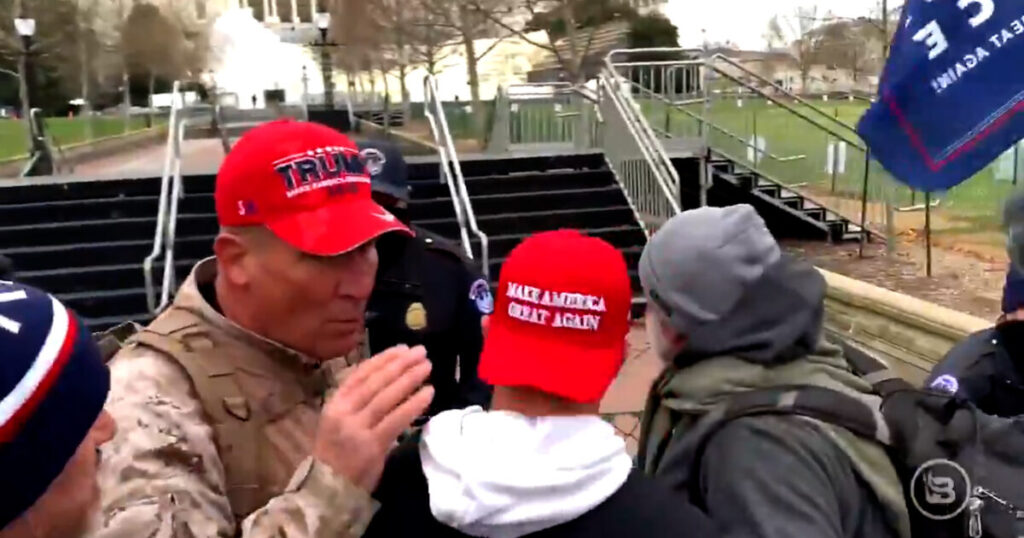On January 6, 2021, the U.S. Capitol was breached by a mob of Donald Trump supporters, granting rise to numerous conspiracy theories and significant legal ramifications. Among those implicated is Ray Epps, a former Arizona resident who has been at the center of right-wing speculation regarding his involvement in the events of that day. Recently sentenced to a year of probation for his participation in the attack, Epps’ case exemplifies a broader narrative about individuals charged in connection with January 6. The Justice Department, in a memorandum related to Epps’ sentencing, released a video image showing him during the riot, underscoring the gravity of the actions taken on that day. As discussions continue regarding the events and the subsequent legal proceedings, questions surrounding the role of government agents during January 6 remain a contentious topic.
The issue of undercover government operatives infiltrating the gathering has been highlighted by defense attorneys involved in cases with the Proud Boys and Oath Keepers. They are poised to expose what they argue are inconsistencies and misleading narratives imposed by authorities about January 6. A recent Twitter “Spaces” conference organized by the Montana Libertarian Party is expected to delve deeper into these allegations tonight. Participants have expressed skepticism towards the government’s narrative and are adamant about the need for transparency regarding the actions of various federal agencies leading up to the Capitol breach.
According to a report from Inspector General Horowitz, the FBI acknowledged deploying at least 26 confidential human sources among the crowd on January 6. However, courtroom accounts during trials have suggested a greater involvement of undercover agents, with some sources estimating numbers as high as 200. Defense attorneys have not only expressed frustration over the overwhelming presence of these agents but have also raised concerns over the implications this holds for their clients’ cases. The situation has led to pointed remarks within the courtroom, emphasizing the strange and potentially manipulative atmosphere faced by defendants, where the line between informant and defendant has become increasingly blurred.
Criticism arises not only against the FBI but also the Department of Homeland Security (DHS) and other agencies like the Secret Service and the CIA. The involvement of these bodies raises critical questions regarding the motives behind the operations carried out on January 6. Clients like Jeremy Brown reported being approached by agents claiming to be affiliated with HSI, indicating a broader spectrum of infiltration beyond just the FBI. The details concerning the extent of government agency involvement in the events leading to the Capitol riot provoke serious discussions about the nature of federal oversight and whether any investigative measures crossed ethical boundaries.
In December 2024, the Inspector General’s report presented little more than a cursory overview of the government’s actions, lacking substantive details that could shed light on the actual findings of the review conducted over the preceding four years. Defense advocates have highlighted the report’s failure to appropriately confront the implications of government infiltration among demonstrators. The report inadvertently painted a picture in which many of the alleged January 6 defendants were merely acting in the absence of any orchestrated conspiracy, as corroborated by evidence presented during trials indicating that most protesters did not have a premeditated plan to cause chaos.
As the legal narrative around January 6 unfolds, figures such as Julie Kelly, a writer at America Greatness, have been emphasizing that defense attorneys systematically asked for information about undercover agents to substantiate their claims of innocence, only to face denial from prosecutors. The FBI maintained that there was no comprehensive database tracking these operatives, creating further opacity around the management of federal informants. Amidst this legal chaos, upcoming discussions on platforms like Twitter serve as a foothold for those skeptical of the official narratives, calling for clarity and accountability regarding the federal agents’ roles on that fateful day and the implications it has for those facing prosecution.

